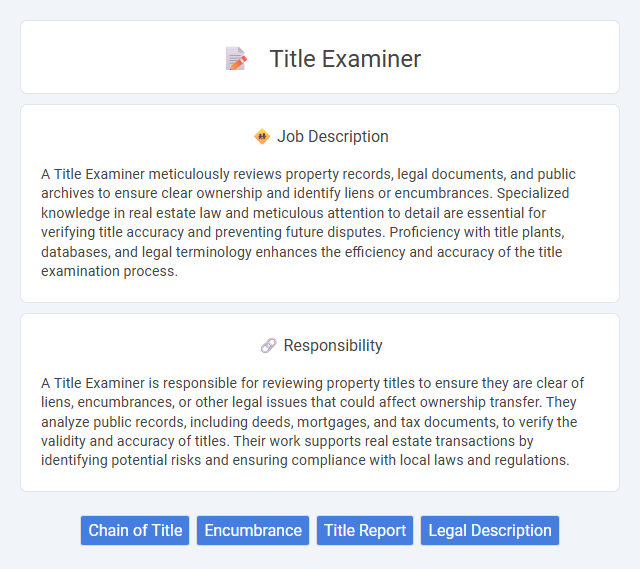
A Title Examiner meticulously reviews property records, legal documents, and public archives to ensure clear ownership and identify liens or encumbrances. Specialized knowledge in real estate law and meticulous attention to detail are essential for verifying title accuracy and preventing future disputes. Proficiency with title plants, databases, and legal terminology enhances the efficiency and accuracy of the title examination process.
Individuals with strong attention to detail and analytical skills are likely suitable for a Title Examiner role, as the job requires meticulous review of property records and legal documents. Candidates who can maintain focus for extended periods and are comfortable working independently may find this position well-suited to their abilities. Those who struggle with repetitive tasks or lack interest in legal and real estate matters might not fit the demands of this occupation.
Qualification
A Title Examiner must possess a comprehensive understanding of real estate law, property records, and title search procedures, typically requiring a high school diploma or equivalent with specialized training or certification in title examination. Proficiency in analyzing public records, legal documents, and ownership histories is essential to identify liens, encumbrances, and defects affecting property titles. Strong attention to detail, analytical skills, and familiarity with local property laws enhance the examiner's ability to deliver accurate and reliable title reports.
Responsibility
A Title Examiner is responsible for reviewing property titles to ensure they are clear of liens, encumbrances, or other legal issues that could affect ownership transfer. They analyze public records, including deeds, mortgages, and tax documents, to verify the validity and accuracy of titles. Their work supports real estate transactions by identifying potential risks and ensuring compliance with local laws and regulations.
Benefit
Title examiners likely offer significant benefits by ensuring property titles are clear of liens and legal issues, thereby reducing risks in real estate transactions. Their expertise may increase the probability of smooth ownership transfers and protect buyers and lenders from potential disputes. Employing a skilled title examiner could enhance overall transaction security and confidence in property investments.
Challenge
Title examiners likely face challenges in navigating complex property records and identifying potential legal issues that could affect a transaction. The probability of encountering ambiguous or incomplete documentation may require sharp analytical skills and attention to detail. Managing these uncertainties is essential to ensure clear and marketable property titles.
Career Advancement
Title Examiner roles offer significant opportunities for career advancement within the real estate and legal industries. Professionals can progress to positions such as Title Officer, Escrow Officer, or underwriter by developing expertise in title research, risk assessment, and document analysis. Gaining certifications and mastering regulatory compliance enhances prospects for leadership roles and specialized career paths in title insurance companies and law firms.
Key Terms
Chain of Title
A Title Examiner meticulously reviews public records to verify the Chain of Title, ensuring that property ownership history is accurate and free of liens or disputes. This process involves analyzing deeds, mortgages, wills, and court records to establish clear ownership and prevent future legal complications. Mastery in identifying gaps or defects within the Chain of Title is crucial for confirming title validity and facilitating secure real estate transactions.
Encumbrance
A Title Examiner meticulously reviews property records to identify encumbrances such as liens, mortgages, easements, and restrictions that could affect ownership rights. They analyze chains of title to detect unresolved claims or legal obligations tied to a property, ensuring clear transfer of ownership. Accurate identification of encumbrances is critical to preventing future legal disputes and safeguarding buyers and lenders.
Title Report
Title Examiners scrutinize public records and legal documents to verify property ownership, liens, and encumbrances, ensuring clear titles for real estate transactions. A critical output of their work is the Title Report, which summarizes findings on property history, outstanding claims, and legal statuses, serving as a foundational document for buyers, sellers, and lenders. This report facilitates risk assessment and legal compliance in real estate deals, reducing the likelihood of future disputes.
Legal Description
A Title Examiner meticulously reviews legal descriptions to verify property boundaries, ownership history, and encumbrances within land records and public documents. Accurate interpretation of legal descriptions is crucial for identifying potential title defects, liens, or disputes that may affect property transfer or financing. Proficiency in reading metes and bounds, lot and block, and other legal property descriptions ensures compliance with real estate laws and supports clear, marketable title assurance.
 kuljobs.com
kuljobs.com